“Concentrated Language Encounter” (CLE) is a fancy name for what can be a pretty straightforward, but very interesting, way to teach basic reading and writing. It makes writing primary, inviting learners to write and illustrate books about subjects that are on their mind. The IDEAL school in Cité Soleil has been learning the process with help from the staff of the Matènwa Community Learning Center.
It’s an interesting partnership: Experienced teachers from a school well out in the Haitian countryside given their time and energy to support a group of young people creating a start-up in Haiti’s most notorious urban slum. The Matènwa school’s excellent first grade teacher spent almost a week in Belekou when the school opened, and during that stay he led the children through the creation of a book about their first day. That was back in January, and here’s the book: firstbook
On the last day of school, I met with the same kids, and we made a second book. The difference between where they were in January and where they are now was plain and very encouraging. The first book was simply a summary of the first day’s activities. For the second book, they wrote about what they like about school.
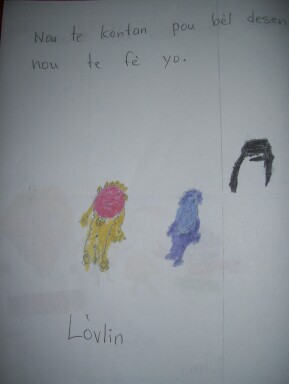
“We enjoyed making pretty pictures.”
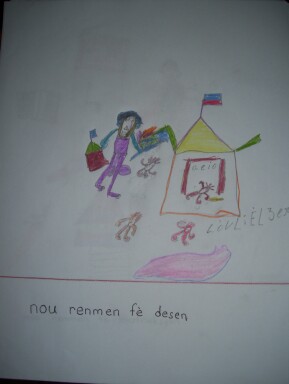
“We love to draw.”
Here are the two pages created by Lovely. The one above is the first one she did the second day of school, and the one below is the page she did six months later. Although the most obvious difference might be that, in June, she was able to write her own name and included letters in her illustration, the quality of the drawing is also quite distinct. She uses much more detail. She seems to have put much more time and care into her work.
Next are the two pages by Marie. Again, the upper one is the one she did in January, and lower one is what she did in June.
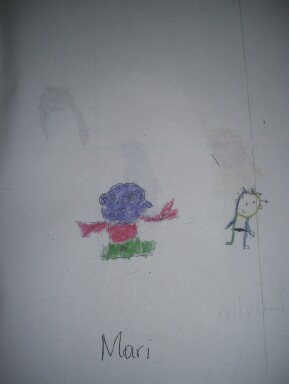
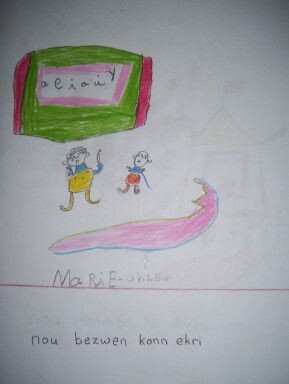
“We need to know how to write.”
It’s much the same story: more detail, more effort to give her figures shape. She writes her name well.
Reginal’s two pages follow. A very small boy, one of a couple of kids that started in January at the right age for a first grader and without any school experience behind him, his progress has been especially striking.
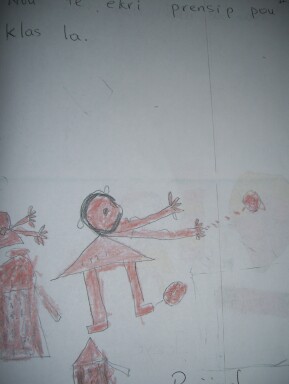
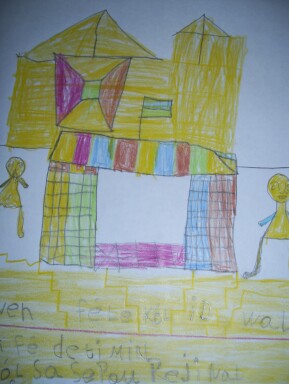
My photography, unfortunately, cut off the texts. The upper one says, “We made rules for the class.” It refers to the way Robert led the children through the creation of classroom rules on the first day of school. The text for the second picture was, “We love the IDEAL school,” but Reginal added quite a bit to it. He wrote, “I made the IDEAL school. I made two children. This school belongs to Reginal.” He didn’t know a single letter of the alphabet in January, but now he writes short sentences.
And the differences between the two drawings is just as impressive. The time and effort he put into drawing a school that fills up the page, and in coloring the school in brightly, suggest that he really is happy to be there.
The last two drawings are by Bebeto. I know him well. He’s a somewhat older boy, the nephew of a member of IDEAL. His uncle, Picard, is a guy in his early 20s, who left primary school before graduating in order to fend for his widowed mother. He supports Bebeto because the boy’s mother and father – Picard’s older brother – are too sick to work.
Bebeto had been to schools before, even to free ones, but never stayed for more than a few months. His history of dropping out had already marked him with a reputation as a //vakabòn//, or bum. And that before his twelfth birthday.
But the IDEAL school really worked for him. The teachers made him feel welcome, and he responded. He barely missed a day, and participated enthusiastically in all the school’s activities.
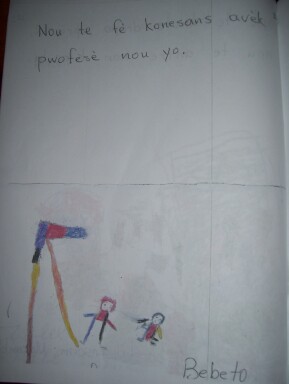
“We met our teachers.”
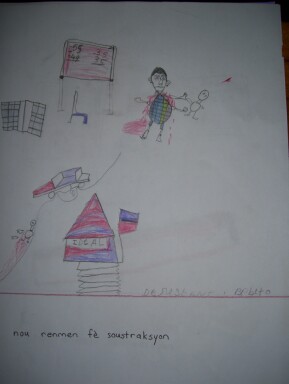
“We love doing subtraction.”
There was a major auto accident about a long block away from the school right around when we were doing the second book, and it made an impression on Bebeto. I asked him why he had drawn a child apparently killing an adult, he just shrugged his shoulders and smiled.
As striking as the violence in his second drawing is, however, so is the improved detail. He took the time to give the people and things he drew shape. And the dramatic shift in the size relation between adult and child from one picture to the next might reflect his growing sense of his own power.
The school itself has a ways to go. The children made two books this year, and both were made with visitors’ help: Robert was there to lead them the first time, and I led the second. The IDEAL team will need to develop the confidence in themselves that’s necessary for them to lead such activities on their own.
But seeing the two books is helping them develop that confidence. They see more clearly than ever the difference they are making in the lives of the neighbors’ kids. And they feel good about that and good about the recognition it leads to. One of the confided to me, for example, that he likes the fact that his neighbors no longer address him by name but instead call him “mèt”, the title that Haitians give to the men who teach.